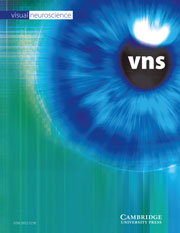Article contents
Alcohol does not affect visual contrast gain mechanisms
Published online by Cambridge University Press: 01 July 1999
Abstract
It has been suggested that acetylcholine plays a role in contrast discrimination performance and the regulation of visual contrast gain (Smith, 1996). Since alcohol has been shown to reduce levels of acetylcholine and contrast sensitivity, the present study measured the effects of alcohol on contrast discrimination and explored whether the deficits could be explained as a consequence of reduction in contrast gain. Detection thresholds and contrast increment thresholds under placebo and alcohol (0.06% BAC) conditions were measured in six volunteers. Alcohol was found to impair both detection and discrimination of only high spatial frequencies. However, when the base contrasts used in the increment threshold task were equal multiples of detection threshold, no alcohol-induced changes in increment thresholds were obtained at any spatial frequency. We conclude that alcohol impairs contrast discrimination performance but that no change in contrast gain mechanisms need be postulated to account for the data.
- Type
- Research Article
- Information
- Copyright
- 1999 Cambridge University Press
- 6
- Cited by


